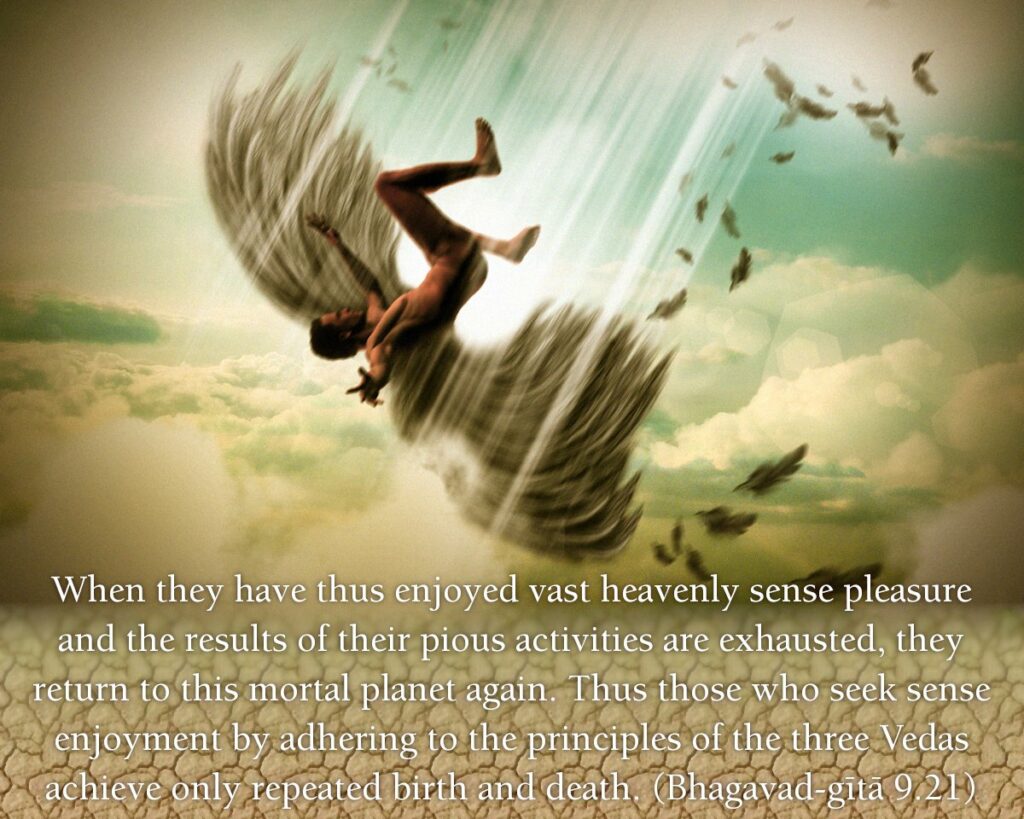ते तं भुक्त्वा स्वर्गलोकं विशालं
क्षीणे पुण्ये मर्त्यलोकं विशन्ति |
एवं त्रयीधर्ममनुप्रपन्ना
गतागतं कामकामा लभन्ते || 21||
te taṁ bhuktvā swarga-lokaṁ viśhālaṁ
kṣhīṇe puṇye martya-lokaṁ viśhanti
evaṁ trayī-dharmam anuprapannā
gatāgataṁ kāma-kāmā labhante
te—they; tam—that; bhuktvā—having enjoyed; swarga-lokam—heaven; viśhālam—vast; kṣhīṇe—at the exhaustion of; puṇye—stock of merits; martya-lokam—to the earthly plane; viśhanti—return; evam—thus; trayī dharmam—the karm-kāṇḍ portion of the three Vedas; anuprapannāḥ—follow; gata-āgatam—repeated coming and going; kāma-kāmāḥ—desiring objects of enjoyments; labhante—attain
Translation:
They having enjoyed the vast Heaven-world, the merit being exhausted, enter the world of mortals; thus, those who desire enjoyments, abiding by the law of the Vedas have to go and return endlessly.
Commentary:
The Lord explains very clearly how the desire-prompted men do not find rest either here or in Heaven. They have to go through the painful process of birth and death. Dying here, they go to Heaven and from there, after exhausting the fruits of merit (punya) they fall back again to the earth, and take birth as mortals. Such is the fate of men yielding to desire, however rich and vast it might be. From this one understands that human life is the only opportunity for Self-realisation. All the other worlds are worlds of enjoyment good or bad. This world is the world of action and jnana. Let us hear the exhortation of Swami Vivekananda – “Man therefore according to Vedanta philosophy is the greatest being that is in the universe, and the world of work is the best place in it, because only herein is the greatest and best chance for him to become perfect. Angels or Gods whatever you may call them, have all to become men, if they want to be perfect. This is the greatest centre, the wonderful poise, and the wonderful opportunity – this human life.”
The Vedas follow a rational order with reference to human life and man’s progress and perfection. The first part is Karma Kanda, the second Upasana Kanda, and the third Janana Kanda. We see how man develops gradually and reaches perfection. The Karma Kanda deals with the desire-fulfilling actions of man. When man discovers that these desires and their fulfillment do not give him rest or peace, he discards them and rises a step higher, and finally, remains at perfection in the realisation of God. He comes to the Jnana Kanda.
Karma is no doubt good in itself, but it should be free from desire and attachment. Otherwise, man has to undergo the painful process of being born again and again either here or in the other worlds. In the Samkhya-yoga and in many other places, the Lord emphasises the need for the elimination of desire as the only way to perfection. Desire implies imperfection. The perfect man cannot have any desires.
The desireless state of perfection should be the goal of all spiritual aspirants.
Question: What is the reward of yajnas?
Answer: Enjoyment in Heaven.
Question: How long?
Answer: Till the merit (punya) is exhausted.
Question: What happens then?
Answer: He returns to the world of mortals.
Question: What is the fate of those who have desires?
Answer: They are subject to birth and death.
Question: What is the nature of Heaven?
Answer: It is a vast place of enjoyment, and has an end.
Bhagavad Gita: Chapter 9 🔻 (34 Verses)
